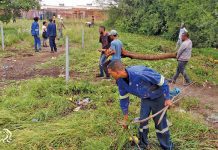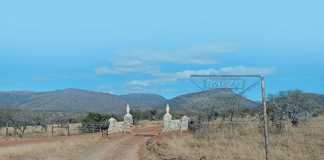Cape Aloes (Aloe ferox) in the Eastern Cape have provided the Xhosa people with medicinal and cosmetic necessities for hundreds of years. Recently their value has been recognised in helping to alleviate grinding poverty in the region. Mike Burgess reports.
Aloe ferox, called Ikhala in Xhosa, grows wild throughout the and in parts of the Western Cape. has been harvested and utilised by indigenous people there for hundreds of years. Over the past two decades, this aloe has fuelled an impressive regional industry. Possibly inspired by a family business called Aloe Ferox in Albertinia in the Western Cape, beverages and pharmaceutical, cosmetic and other products are now being produced from Aloe ferox for local and international markets in the same way Aloe vera is exploited in the US.
Joint venture
Aloe ferox is now playing an important role in the empowerment of various communities in the former Ciskei and Transkei by incorporating and consolidating harvesters into this already functioning and growing industry. In 2003/04, a joint venture between African Aloe, a company based in Uniondale with more than 10 years experience in the exportation of Aloe ferox products, the Eastern Cape Development Corporation (ECDC) and Aloe ferox harvesters in the Eastern Cape has resulted in the Ikhala Agricultural Co–operative. Ken Dodds, managing director of African Aloe, says the aim of the cooperative ”is to consolidate harvesters in the Eastern Cape and to give them a consistent market.” The hub of the cooperative is a pre-processing plant in the tiny Eastern Cape town of Seymour. It produces Aloe ferox raw materials including aloe bitters, fillets and leaf powders under a supply agreement for African Aloe. The Ikhala Aloe ferox range of products are produced here. ”What makes the project unique,” explains Glen Winterton, Co-operative secretary, ”is that it takes no input from an agricultural perspective. Harvesters simply need to reap what nature presents to them.”
Benefits for surrounding communities
In 2004, the UN International Trade Centre based in Switzerland began funding workshops and training. This included tapping and harvesting techniques, environmental conservation and HIV/Aids awareness campaigns. The organisation is also committed to market development and the promotion of Ikhala products in the future. Today, approximately 120 tappers and harvesters, 80% of whom are women, supply the plant. As such, they have been able to stabilise their income from Aloe ferox growing in the communal areas around them. And in an area characterised by acute unemployment, more than 20 workers are employed in the pre-processing plant during full production.
Nomolumzi Pete, a member of the plant’s 10 permanent staff members explains how work is very scarce in the area. Her income from the factory is stable and enough to let her rise from the poverty. ”A number of friends who harvest are now also making a decent living through the Ikhala Co-operative. It has made a difference to many in this community.” But marketed nationally and internationally, it is the Ikhala product range, manufactured in Uniondale, that will eventually ensure real growth and prosperity for all involved in this unique initiative.
Ikhala products and markets
”Ikhala produces the highest quality Aloe ferox range for local and international markets,” says Glen. An Ikhala cosmetic range for all skin types has recently been launched for the local market. It includes shampoo, regenerating gel, night cream, hand and body cream, hand and nail moisturiser, facial wash, moisturising cream, hair conditioner and toning lotion. Priced competitively, it is distributed via sales agents across the Eastern Cape.
An Ikhala outlet in East London, run by Cindy Ben, provides about 80 mostly women agents in the Eastern Cape with Ikhala products to distribute. She explains, ”I recruit sales agents who pay a R30 joining fee. They then buy Ikhala products at cost price to sell at a mark-up to their surrounding communities.” Currently major sales are to individuals specifically in King Williamstown, Mthatha, Butterworth and Mount Frere in the former Transkei. Most prospective agents who arrive to buy Ikhala products are unemployed and poor. Ikhala offers them a real opportunity to generate income. Many users of Ikhala products are more affluent Africans who recognise the plant from traditional applications and are therefore tend to buy the products. Cindy says besides the cosmetic range, one of the most popular products is Ikhala Whole Leaf Aloe Juice. It assures relief from heartburn, stomach problems, arthritis, hypertension and stress. It even aids digestion and boosts the immune system. Most exciting for the Ikhala brands, however, are niche markets that are being accessed internationally.
Ken explains that the general move globally towards natural products allows the Aloe ferox market to grow. T-he perfect rugged African organic perception of the Ikhala product is created bythe fact that no herbicides, pesticides or fertilisers are used in the production of aloe leaves, and that they are harvested in the wild. In 2005, the cosmetic distributor Men’s Essentials based in Ottawa, Canada, agreed to distribute Ikhala’s men’s range in North America. This includes a facial wash, smooth facial scrub, moisturiser, shower gel, shaving gel, hair gel, hair gel with protein, and eye cream. These international markets are now being broadened and Dodds explains that Ikhala representatives are currently in Japan and Malaysia attempting to finalise contracts with interested distributors there. Contact Glen Winterton on 083 390 3404. |fw
Sustainable aloe harvesting
The conservation of Aloe ferox is vitally important to ensure the sustainable harvesting of these plants by rural harvesters. Glen Winterton explains that harvesters work under strict permit conditions issued by the Department of Environmental Affairs based in East London. Only a fraction of the lower leaves are cut from each plant so that the growth point in the crown of the plant is not injured. Such practices during harvest will ensure the survival of the aloe and future harvesting. Veld management techniques and the preservation of younger plants are also encouraged to ensure conservation and the industry’s sustainability. Tokozile Boboyi, project development specialist from the ECDC says plans are underway to cultivate Aloe ferox in tunnels. This will also enable elderly harvesters the opportunity to cultivate these plants near their homes for more convenient harvesting.












